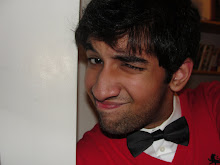
Vincent Cassell informs his group of New York City ballet dancers that he's going to stage the old staple of ballet, Swan Lake. But it's going to be different. It's gonna be stripped down — visceral, real.
He chooses Natalie Portman's character Nina Sayers — a shy, self-conscious and quaint figure. An ambitious dreamer. The first half of Darren Aronofsky's Black Swan kind of plays out like her character. It misses some steps trying to get the story along, a lot of it is really very obvious. No real depth. Barbara Hershey's role as Nina's mother is perfectly chilling in its own right, but she's not allowed much depth to delve into. Vincent Cassell's Tomas' sleaze is really rather one-dimensional. His humanity hardly present.
Portman, however, is already the best we've ever seen her at this point. Her physicality in her dancing is impressive enough as it is, but emotionally we see a frail young woman at the end of her string. A string of delicacy that Portman dances over like a man on wire's balancing act. A poetic portrait surrounded by light strokes, as meticulous as the perfection Sayers strives for.
Tomas needs Nina to break out of her shell. Her innocence is perfect for the White Swan in the production, but he needs her to break loose into her Black Swan. In her ambition she falls into herself into a state of insanity. Slowly she devolves until she completely lets go. Much like the film does, as well.
Much as the first half mirrors Nina Sayers' state of mind, the second half of the film perfectly reflects her descent into dark delirium and operatic madness. We see the full force of a true maestro's ferocious ambition with Aronofky's direction — we see a true vision find its wings and take flight on the screen as Sayers goes out on stage for her first performance. Every element, every shot is so necessary but flows much more freely than the first half did. Nina Sayers' transformation is truly a sight to behold.
And much of that credit is owed to one Natalie Portman, who took up the challenge and for the first time in her career seemed to transcend the bounds of performance into being. Truly immersive, if Aronofsky paints the world of madness she drags you down right in with her. You're transfixed onto her until the very last shot where you're left dumbfounded.
Countering Portman's white swan is Mila Kunis' black swan of Lily. Effortless, real, unconscious. Next to Portman, wound up like the music box with a spinning ballerina she keeps by her bedside, you really see what Tomas is referring to with Lily's free energy. She plays off of Portman incredibly effectively, and gives perhaps the best major supporting performance in the film.
Aside from Kunis the other worthwhile mention is of Winona Ryder's cameo. Aggravated with being older and washed up, we see her Beth already through Natalie Portman's hell and back many a time. She makes the most of her limited screentime by emanating a paradoxically fiery chill to her character. One who's on edge, fierce, but at the same time you could see a haunting in her. Her career has taken everything out of her, and now she's just the empty shell of a woman without it.
Aronofksy has created a truly bold piece of cinema, using every element from Libathique's kinetic camerawork to Clint Mansell's crowning achievement in the music to push the limit on what is cinematically possible. He takes a familiar story of one descending into madness through art, seen and perfected in a movie like The Red Shoes before it — but strips it down; making it intimate, real. And with it finding a mainstream audience witnessing the psychological horror before them, it looks like we could have a real game changer on our hands.

No comments:
Post a Comment